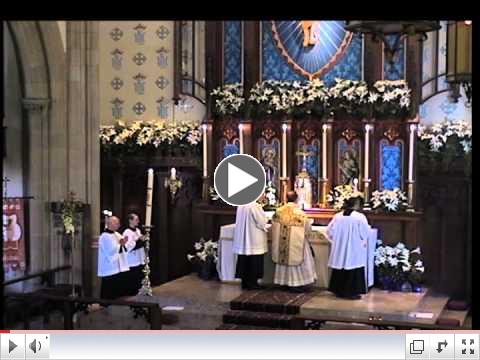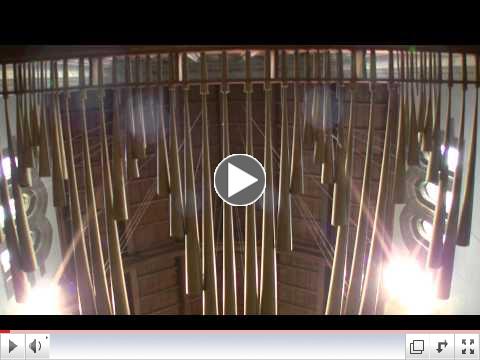|
|
|
Greetings!
St. Thomas the Apostle is an Episcopal Parish in the Anglo-Catholic tradition. We are called by God to be a holy place where love is found, where all are named and where hearts are freed to change the world.
St. Thomas has a great respect for both the rich liturgical heritage of the church and for living the message of social justice proclaimed by Jesus Christ. Whether you are young or old, gay or straight, single, married or in a relationship, female or male, poor or wealthy, you are welcome at St. Thomas just as you are...a child of God and an inheritor of God's grace. |
|
|
NO VIGIL MASS TOMORROW
The Vigil Mass on Saturday, 4 February has been cancelled.
As a reminder, the Daily Masses (Monday through Friday 7pm & Saturday 10am) have been replaced with Compline and Midday Prayers until Fr. Davies' return on 21 February. |
|
Complete Latin Vigil Mass (including world premiere of Judith Bingham's new anthem commissioned for St. Thomas)
 | | Latin Vigil Mass with LASchola |
Did you know that all of the Sermons from March 2011 on are available online at our website and on our YouTube channel?
|
Fr. Davies will be on holiday beginning Monday, 30 January and will be returning on Tuesday, 21 February. On 6, 13, & 20 February, Fr. Gabriel Ferrer will be the Guest Celebrant & Preacher.
PLEASE NOTE: The Daily Masses (including Saturday mornings) will be replaced with Midday Prayer and Compline services until Tuesday, 21 February.
|
Ash Wednesday - 22 February

This Ash Wednesday, the Parish Church will offer three Masses with the Imposition of Ashes:
8am - Low Mass
12pm - Low Mass
7:30pm - Pontifical High Mass with Bishop Diane Bruce Celebrating
|
|
St. Anskar, Archbishop of Hamburg, Missionary in Denmark and Sweden, 865 (February 3)
 | | "Ansgar" by Hugo Hamilton (1830) |
After his mother's early death, Ansgar was brought up in an abbey, and made rapid progress in his education. When, as a boy, he had a vision that his mother was in the company of the Blessed Virgin Mary, his careless attitude toward spiritual matters changed to seriousness. This vision is thought to be the main motivation behind St. Anskar's life.
St. Anskar was a product of the phase of Christianization of present day Northern Germany (begun by Charlemagne). When this region was no longer the focus of Christianization, a group of monks (including St. Anskar) were sent to present day Denmark. After two years of educating young boys, St. Anskar returned to Northern Germany for a short period before responding to a request from the Swedish king for a mission to the Swedes for two years.
In November 831, St. Anskar was consecrated Archbishop of Hamburg. For a time, St. Anskar devoted himself to the needs of his own diocese, which was still missionary territory with only a few churches. He founded a monastery and a school in Hamburg; the school was intended to serve the Danish mission, but accomplished little.
In 845, the Danes unexpectedly sacked Hamburg, destroying all the church's treasures and books and leaving the entire diocese unrestorable. St. Anskar had lost his see and his revenue. Many of St. Anskar's supporters deserted him, but the new king, Louis the German, came to his aid; St. Anskar was awarded the vacant diocese of Bremen where he took up residence until 848.
Through much political turmoil, St. Ansgar continued his mission to the northern lands. The Danish civil war compelled him to establish good relations with two kings (Horik the Elder and his son, Hork II). Both assisted him until his death. He was able to secure recognition of Christianity as a tolerated religion. St. Ansgar died in Bremen in 865. His life story was written by his successor, Arcbhsiop Rimbert, in the Vita Ansgarii.
|
|
|
|
|
The Guibord Center presents "Religion from the Heart:
Sufism 101"
Sunday, 26 February 1:30pm
St. John's Pro-Cathedral
514 West Adams St.
Noor-Malika Chishti, an authorized Representative of Pir Zia Inayat-Khan, President of the Sufi Order International, and John Ishvaradas Abdallah, a speaker, writer and the author of A Sufi's Ruminations on One World Under God, will explore the wonder of Sufism. A reception follows. Please RSVP online www.theguibordcenter.org The Guibord Center is a non-profit organization whose mission is to bring people together to challenge assumptions, unleash The Holy and affirm the faith that transforms the world.
|
|
|
|
|
|
Septuagesima
Lections
Isaiah 40:21-end
Psalm 147:1-12
I Corinthians 9:16-23
St. Mark 1:29-39
Celebrant (8am & 10:30am)
Choir Master & Pianist
Jim Keltner
|
|
PRELUDE
"Nicht schnell" & "Einfach innig" from Drei Romanzen, op. 94
by Robert Schumann
POSTLUDE
"Third Movement" from Concerto for Clarinet in A, K.622
by W.A. Mozart
This week's guest musician:
Mr. Ran Kambel, Clarinet
See the announcement about The Organ Project online!
|
|
On This Day in Church History
On this day in 1377, more than 2,000 people were slaughtered in the Italian city of Cesena by Papal Troops during the War of the Eight Saints.
|
|
Please join us for many Parish activities. Here's a sampling of upcoming events - a full list is available online
5, 12 & 19 February
Fr. Davies on vacation
Fr. Gabriel Ferrer celebrates and preaches
11 February @ 7:30am
Homeless Feeding & Outreach
15 February @ 7:30pm
Vestry Meeting
18 February @ 10:30am
Newcomer Orientation Series
20 February
Parish Office Closed
25 February @ 5:00pm
LASchola sings the Mass
27 February @ 9:30am
County-USC AIDS Clinic Feeding Program
|
|
ePrayer
Prayer is at the center of our worship and binds us together as a community of faith. This week we commenced our electronic prayer chain email. A list of persons on the prayer list is sent weekly.
The prayer chain email is an opt-in list only - it will not be sent unless you sign up for it. If you'd like to be on this distribution list, please update your profile (please use link at the bottom of the email, customized with your email) or contact the office.
|
|
Video Introductions
A brief introduction to the liturgy at St. Thomas:
 | | St Thomas Liturgy Sampler.mov |
A brief introduction to St. Thomas, its history, its place in Hollywood, the Damien Chapel and the organ.
 | | Introduction to St. Thomas |
|
|
|
|
|
|
|
|
|